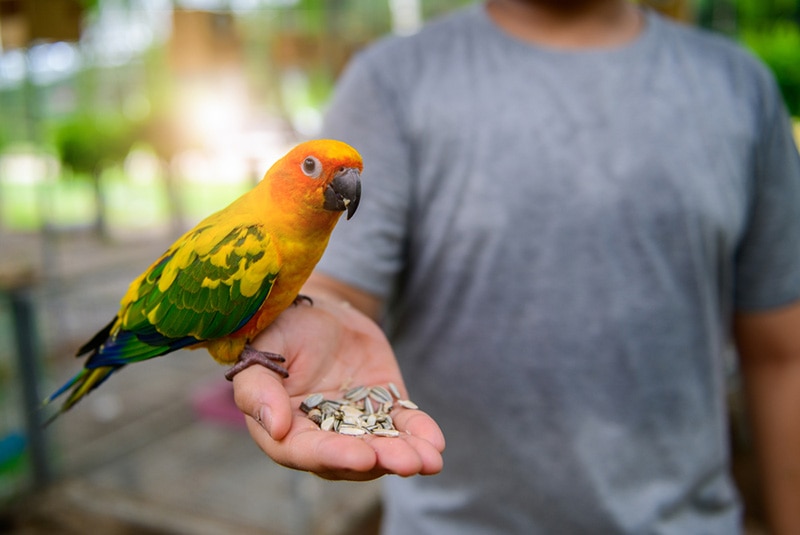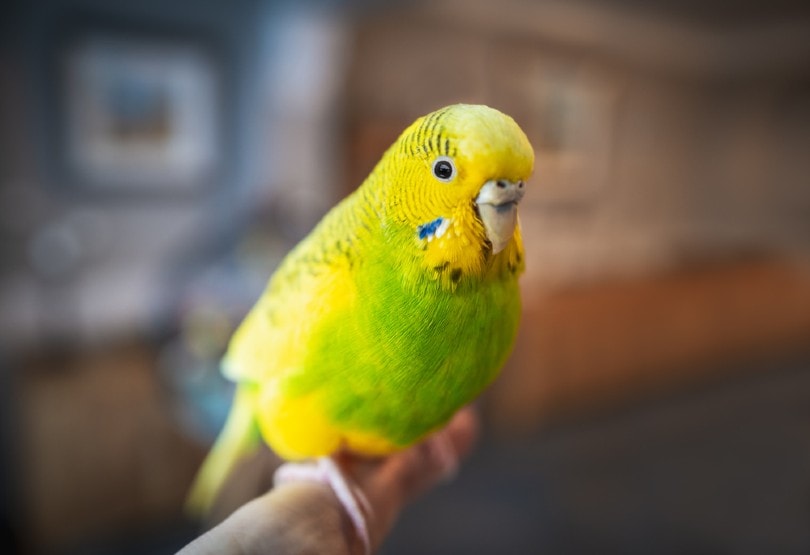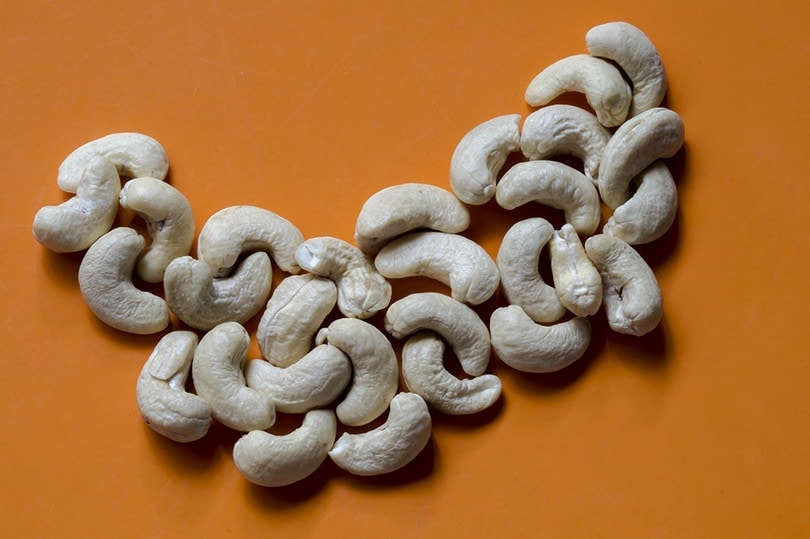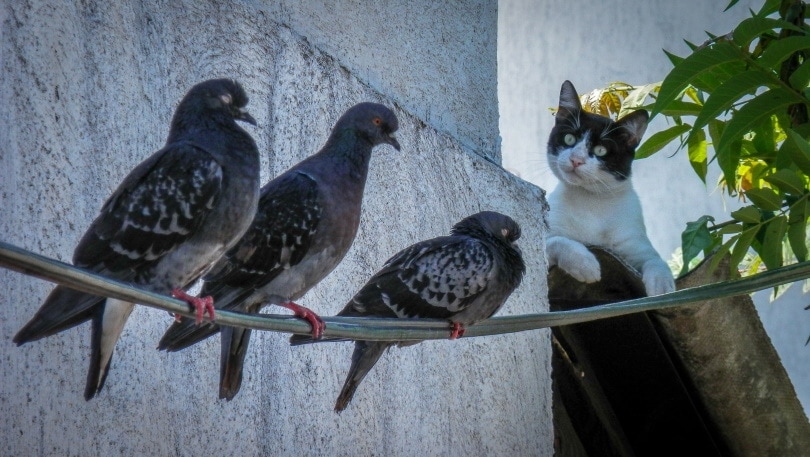10 Best Parrot Foods – 2024 Reviews & Top Picks

Updated on

There are hundreds of species of parrots of various sizes, colors, and temperaments. Similarly, they can have very different nutritional requirements and dietary preferences. Macaws prefer a diet heavy on nuts while Caiques enjoy fruit-heavy food.
Generally, though, parrots eat a diet that consists of seeds, nuts, fruits, vegetables, and other plants. Ensuring your parrot gets the best diet is important, as it will help ensure your bird lives a long and healthy life.
Below are reviews of 10 of the best parrot foods including pellets as well as organic mixes, to meet the needs of most pet parrot species and most budgets.
A Quick Comparison of Our Favorites in 2024
| Rating | Image | Product | Details | |
|---|---|---|---|---|
| Best Overall |

|
ZuPreem FruitBlend Flavor Bird Food |
|
Check Price |
| Best Value |

|
Kaytee Forti-Diet Pro Health Parrot Food |
|
Check Price |
| Premium Choice |

|
Lafeber Tropical Fruit Nutri-Berries Parrot Food |
|
Check Price |

|
Kaytee NutriSoft Parrot & Conure Bird Food |
|
Check Price | |

|
3-D Parrot Food |
|
Check Price |
The 10 Best Parrot Foods
1. ZuPreem FruitBlend Flavor with Natural Flavors Daily Parrot & Conure Bird Food – Best Overall
| Food Type: | Pellets |
| Volume: | 12 Pounds |
| Main Ingredients: | Ground Corn, Soybean Meal, Ground Wheat |
ZuPreem FruitBlend Flavor with Natural Flavors Daily Parrot & Conure Bird Food is a premium pellet food that includes tasty treats like oranges, apples, grapes, and bananas. It is fortified with vitamins and minerals and is best suited to African Greys, Conures, Amazons, and Cockatoos.
Pellets are a convenient food type, fairly uniform in their shape and consistency, therefore preventing birds from choosing their favorite ingredients and leaving the rest, which can lead to a poorly balanced diet. They’re also less messy, although they won’t stop a Conure from flipping its food bowl over. ZuPreem is quite expensive but reasonably priced compared to other premium foods.
The food does contain food coloring, which may attract parrots but seems unnecessary in animal food.
- Well-priced for a premium food
- Contains appealing fruit
- Fortified with 21 vitamins and minerals
- Contains food coloring
2. Kaytee Forti-Diet Pro Health Parrot Food – Best Value
| Food Type: | Seed-Based Blend |
| Volume: | 25 Pounds |
| Main Ingredients: | Sunflower Seed, Safflower Seed, Oat Groats |
A seed blend contains a variety of different flower and plant seeds. The blend tends to be high in omega fatty acids and other oils, but it lacks the fruit and greens typically found in pellet formulae. Seeds can also be somewhat lower quality because they contain husks and may end up little more than a pile of dust at the bottom of a bag. But, when combined with other foods, seeds can make up the bulk of a parrot’s diet.
Kaytee Forti-Diet Pro Health Parrot Food is a seed blend consisting of sunflower and safflower seeds, oat groats, and a variety of other seeds. It is also fortified with vitamins and minerals to ensure a balanced and nutritional diet.
The food is inexpensive, although you do need to buy a big bag to get the best deal, but it does contain peanuts and sunflower seeds, which are not considered ideal for species like African Greys. With that said, this is the best parrot food for the money, in our opinion.
- Inexpensive food
- Fortified with vitamins and minerals
- Offers lots of omega-fatty acids
- Not suitable for all parrot species
- Ideally needs to be combined with other ingredients
3. Lafeber Tropical Fruit Nutri-Berries Parrot Food – Premium Choice
| Food Type: | Seed Blend |
| Volume: | 14 Pounds |
| Main Ingredients: | Corn, Hulled White Proso Millet, Safflower |
Lafeber Tropical Fruit Nutri-Berries Parrot Food is a premium seed-based food that comes in nugget-like clusters. It contains a wide variety of seeds, flowers, premium fruit, and other ingredients. The seeds have been hulled, which means all of the package content is edible. Up to 30% of the weight of a seed can be taken by the hull, which means they represent a lot of waste. They also need clearing up. Hulled seeds make less mess and generate less waste.
The food is a complete diet, which means it doesn’t need supplementing with any other ingredients, and while it is expensive, it is a high-quality mix of premium ingredients. To get the best value, you will need to buy a large tub, and this means that the seed, which starts out moist, can dry up and become less appealing to picky parrots.
- Seeds are hulled
- Includes premium fruit ingredients
- Seed clusters encourage the use of feet and beaks
- Expensive
- Can dry out in the packet
4. Kaytee NutriSoft Parrot & Conure Bird Food
| Food Type: | Pellets |
| Volume: | 3 Pounds |
| Main Ingredients: | Rice Flour, Ground Wheat, Vegetable Glycerin |
Kaytee NutriSoft Parrot & Conure Bird Food is a pellet food but rather than the hard pellets that some birds stay away from, each pellet is soft and easy to tackle. The food smells fruity, too, which should be enough to appeal to picky eaters and convince them to feed. It is reasonably priced for a premium food that contains fruit ingredients including apples and oranges, and it is fortified with vitamins and minerals to ensure it meets your parrot’s daily nutritional requirements.
The soft texture and fruity smell will appeal to some birds, especially those that turn their beaks up at harder pellets, but it is crumbly which means it is easily broken and can cause a lot of mess while resulting in more food being left on the floor of the cage than in your parrot.
- Reasonably priced for a premium food
- Soft pellets are easy to grab and chew
- Fruity smell will appeal to picky eaters
- Crumbly pellets are easily destroyed
5. 3-D Parrot Food
| Food Type: | Seed Blend |
| Volume: | 4 Pounds |
| Main Ingredients: | Corn, Sunflower Seed, Safflower Seed |
3-D Parrot Food is a 4-pound jar of seeds and other plants, fortified with vitamins and minerals, to offer a complete nutritional diet for parrots. Minerals are chelated, which means they are better absorbed by the body and your parrot gets more of the benefits of these essential ingredients. The tub itself is plastic and it has a freshness seal on the lid which keeps the seeds fresh and prevents them from going stale in the tub.
There are a lot of sunflower seeds in the mix, and they are still in the hull, which means you will have quite a lot of mess to clear up, but the convenient tub is very reasonably priced and can form a good basis for a balanced and appealing meal.
- Cheap
- Resealable jar keeps the food fresh
- Chelated minerals are better absorbed by your parrot
- High concentration of sunflower seeds
6. Brown’s Encore Premium Parrot Food
| Food Type: | Seed Blend |
| Volume: | 8 Pounds |
| Main Ingredients: | Safflower Seeds, Striped Sunflower Seeds, Corn |
Brown’s Encore Premium Parrot Food is a seed blend with the main ingredients of safflower seeds, striped sunflower seeds, and corn. Other ingredients include peanuts and colorings. The high concentration of sunflower seeds and the inclusion of peanuts means you will need to ensure that your parrot doesn’t just cherry-pick these favorites out and leave the rest of the mix. As well as being fortified with vitamins and minerals, Brown’s also contains probiotics that aid in good digestive health and help keep your parrot healthy.
Although the food is primarily seeds, it does contain orange flavoring, which will make it more appealing to fruit-loving birds and picky eaters.
- Very good price
- Contains probiotics to encourage good gut health
- Orange flavoring adds appeal
- Contains lots of sunflower seeds and peanuts
- Contains coloring
7. Mazuri Large Bird Food
| Food Type: | Pellets |
| Volume: | 25 Pounds |
| Main Ingredients: | Ground Corn, Wheat Middlings, Dehulled Soybean Meal |
One of the problems with feeding pellets to birds is that it doesn’t encourage natural foraging. In the wild, birds would use their claws and their beaks to forage for food from the ground and they would gather morsels of food of different sizes and shapes. Uniform pellets are designed to be easily picked up in the beak.
Mazuri Large Bird Food is pelleted food but the pellets aren’t uniform. There are smaller and larger pellets, as well as some with holes. They encourage a more natural feeding style.
As well as the primary ingredients of ground corn, wheat middlings, and dehulled soybean meal, the food contains vitamins, minerals, and probiotics. It is very reasonably priced, especially if you buy the large 25-pound bag. Some of the pellets are quite small, so may not be suitable for very large parrots.
- Cheap
- Different sizes and shapes of pellets
- Contains probiotics
- Some of the pellets are very small
8. Bird Street Bistro AppleBerry Feast on the Fly Bird Food
| Food Type: | Dehydrated |
| Volume: | 11 Ounces |
| Main Ingredients: | Pre-Cooked Brown Rice, Organic Couscous, Organic Triticale |
As well as feeding seed mixes and pellets, you can also supplement your parrot’s daily food with fresh fruit and vegetables. Doing so will give your bird an appealing treat and it will help provide all the necessary vitamins and minerals your bird needs, but it does mean buying fresh produce regularly and preparing it before feeding.
Bird Street Bistro AppleBerry Feast on the Fly Bird Food does require some preparation, but it can be prepared in the microwave in just 2–3 minutes. The resulting rehydrated food will taste and smell fresher, so most parrots will love it.
It contains organic and high-quality ingredients and is free of artificial ingredients and fillers, but it is expensive, which means it will make an addition to an existing diet, rather than being the only food you give your bird.
- Contains organic and natural ingredients
- Smells and tastes fresh
- No artificial ingredients or fillers
- Expensive
- Does require some preparation
9. Higgins Vita Seed Parrot Food
| Food Type: | Seed Mix |
| Volume: | 25 Pounds |
| Main Ingredients: | Sunflower Seeds, Safflower, Buckwheat |
Higgins Vita Seed Parrot Food is a seed mix with the primary ingredients of sunflower seeds, safflower, and buckwheat. It is very reasonably priced, but it does have a high concentration of sunflower seeds so you may need to mix it with other foods to ensure your bird is getting a good variety in its daily feed.
While there are a lot of seeds, Higgins Vita Seed Parrot Food also contains a good amount of fruit, including papaya, pineapple, raisins, and bananas, and it also has probiotics that help promote good gut health.
- Contains several different fruits
- Cheap
- Contains probiotics
- High concentration of sunflower seeds
10. Higgins Sunburst Gourmet Blend Parrot Bird Food
| Food Type: | Seed Blend |
| Volume: | 3 Pounds |
| Main Ingredients: | Safflower, Sunflower Seeds, Oats |
Higgins Sunburst Gourmet Blend Parrot Bird Food is a seed blend that contains safflower, sunflower seeds, and oats as the main ingredients. It also contains raisins, papaya, pineapple, and bananas as well as other fruits. Although the food is colored, it uses natural colorings and is further enhanced with natural flavors, too. You will also find natural omega-3 to support the immune system.
There aren’t too many sunflower seeds, which is a common problem with seed mixes, although it does still contain peanuts, so you may need to take care to ensure that your parrot doesn’t just eat the nuts and sunflower seeds while leaving everything else.
- Contains several types of fruit
- Includes omega-3 from natural sources
- Doesn’t contain artificial flavors
- Expensive for a seed mix
Buyer’s Guide: Choosing the Best Parrot Food
There are hundreds of species of parrots, from the small Parrotlet to the giant Macaw and from the relatively peaceful Cockatiel to the mouthy Cockatoo. Virtually every species has a slightly different diet in the wild, and you must replicate this diet as closely as possible for your pet parrot. This typically means feeding a combination of seeds, commercial food pellets, and some fresh food.
Parrot Diet
Generally, a good diet for a parrot consists of commercial food, or pellets, combined with seeds and other supplementary foods. Because every species does have slightly different requirements, you should choose a food that is suitable for your specific parrot species so you will need to do some research to find out what is best.
Seeds
Although parrots will eat seeds, and they will form a reasonable portion of your bird’s diet, seeds alone will likely cause deficiencies in certain vitamins and minerals. They are the avian equivalent of junk food and should not make up the majority of a bird’s diet. Instead, try to keep the amount of seeds in your bird’s diet to about 25% of their total food intake.
One of the problems with seed mixes is that birds can pick out their favorite ingredients and fling the rest out of the bowl, so your parrot could end up with a diet high in peanuts and sunflower seeds.

Commercial Food
Pelleted foods are often sold as complete foods, but you will need to ensure that one contains fruits, vegetables, and some seeds, and it will likely need to have been fortified with essential vitamins and minerals to meet the unique nutritional requirements of your pet.
Some owners do not like pellets because they are uniform and they do not mimic the natural foraging that birds would have to use when feeding in the wild. Feeding a diet consisting solely of pellets runs the risk of your parrot getting bored of the food and refusing it.
Vegetables
Some vegetables are packed full of nutritious vitamins and minerals that are highly beneficial to birds. Some are naturally sweet, too, and may appeal to picky eaters. Stick with leafy greens as well as vegetables like carrots and sweet potatoes. Vegetables can be fed raw or cooked. Some birds will prefer them raw but others might prefer them warm and gently cooked. Don’t fry the vegetables, rather boil or steam them.

Fruits
Although high in sugar, some fruit in your bird’s diet can be beneficial. Mix up the varieties and types of fruit, always remove pips and seeds, and try to stick to those that the bird would encounter in its natural habitat. Common fruits you can feed include pineapple, bananas, apples, and mangos.
Grains and Other Foods
You can also feed other foods, such as grains and legumes. Sprouted seeds can also be beneficial because they are highly packed with nutrients that might otherwise be lacking from the diet.

Introducing a New Food
When giving a parrot a new food, it is important to introduce the food gradually. Generally, this means feeding around three-quarters of the bird’s old diet with a small amount of the new food. Over around 10 days, you can gradually increase the ratio of new food to old food.
Should Parrots Have Food Available All Day?
In the wild, parrots would eat in the morning and late afternoon, rather than snacking all day long. To match this routine, it is a good idea to feed on a similar schedule. At the very least, you can give meals that are spaced 12 hours apart.
However, many owners do leave bowls out all day long so their parrots can eat whenever they like. If you intend to use food as a treat, which can be especially beneficial if you are trying to train a parrot, you won’t want to leave food down or your bird won’t consider it a treat.

How Much Should a Parrot Eat a Day?
Another potential problem with free feeding, or leaving food down all day, is that it is more difficult to calculate and measure how much food is being given. If your parrot eats everything in the bowl within the first couple of hours, you can’t leave it without food until the next day.
Overfeeding can lead to weight and other problems, so you should measure the amount you give.
Depending on the species, it is generally recommended that they eat between a quarter and half a cup of pellets every day, and if you supplement pellets with other food types, you will need to adjust the amounts accordingly.
Should I Leave Food in My Bird’s Cage at Night?
It is a good idea to remove all leftover food from your bird’s cage at the end of the night. This means they can have fresh food the next morning and it also means they are more likely to be hungry and ready for breakfast.

Why Do Parrots Drop Most of Their Food?
In the wild, parrots would eat part of the seeds and other foods and then fling the rest to the ground. This actually helps with pollination and providing food to animals on the ground. They copy this same process when they eat bits of food and fling the rest around the cage, so it is natural.
You will likely also find more mess if you feed a lot of seeds, and they haven’t been hulled, because your parrot won’t eat the hulls. Finally, some pellets are more brittle than others, which means they break apart more easily with bits of the pellet finding their way to the ground of the cage.
Conclusion
Parrots can make great pets. They are intelligent, can take very well to handling, and they are bright, colorful, and beautiful creatures. They can also be quite difficult. For example, some will eat pretty much anything you give them, but others are very picky eaters who will leave everything they don’t like. Fortunately, there are plenty of parrot food options on the market. Above, we have included reviews of 10 of the best parrot foods to help you find one that your parrot will readily eat.
ZuPreem FruitBlend Flavor with Natural Flavors Daily Parrot & Conure Bird Food are well priced for premium pellets, contain fruit as well as seeds, and are fortified with vitamins and minerals to ensure a full, balanced diet. Kaytee Forti-Diet Pro Health Parrot Food is an inexpensive seed feed, but it will need supplementing with other food types to ensure a balanced diet.
- See Also: 10 Best Foods for Amazon Parrots
Featured Image Credit: kwanchai.c, Shutterstock
























